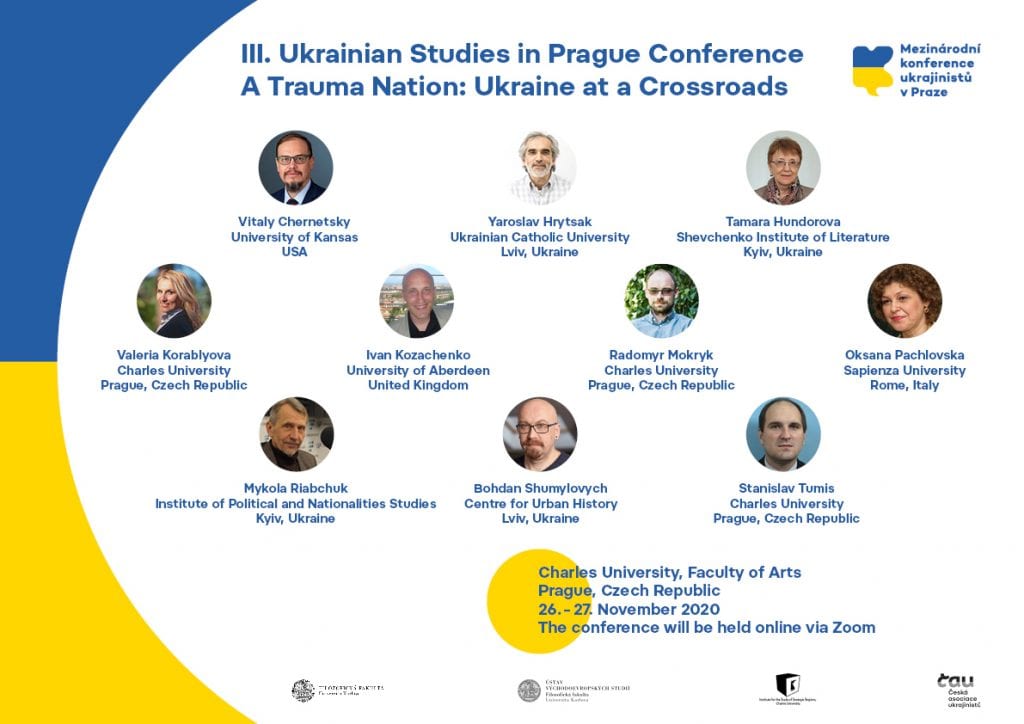

Součástí projektu KREAS

Institute of East European Studies
Faculty of Arts
Charles University (Prague, Czech Republic)
26-27 November 2020
Anthony Smith famously claimed that historical traumas and memories of collective suffering constitute a nation out of a heterogeneous population. This recipe of nation-building was propped up in the late 20th century by “the rise of the victimhood culture” (Campbell & Manning 2018). Inspired by the anti-colonial discourses and the symbolic capital gained by all sorts of oppressed minorities through insisting on their traumas, Eastern European nations engaged in what Timothy Snyder calls “competitive martyrdom.” Ukraine is a telling case thereof: quite outspokenly starting from Viktor Yushchenko’s presidency (and long before in the intellectual circles), the national identity was being built around traumatic events – the Great Famine in the past and the Russo-Ukrainian war in the continuing present stand as the nodal points of the national drama. However, such a reading poses a number of uncomfortable questions. Not all the members of the community are receptive to these efforts: some of them recognize an alternative set of traumas (Pal Tamas aptly labelled them the “orphans of the Białowieża Forest”), others reject the victimhood identity altogether. On top of that, the oppressor does not recognize the trauma(s) thus creating a deadlock. On the personal level, psychotherapists recommend acknowledging a trauma, articulating it, then letting it go. But what is a way out for the Ukrainian society at large? Is the celebration of anti-colonial fighters and the insistence on the postcolonial status helpful? Does the recurring (re)articulation of historical traumas solidify the national brotherhood or weaken the still-hegemonic national project? How to recognize historical traumas without getting stuck in them? And, finally, what is the role of public intellectuals in the current debates on the issues?
Time: approximately 20-25 minutes for each presentation
Day 1 (Thursday 26.11.2020, 16:00 – 18:00)
Yaroslav Hrytsak, Ukrainian Catholic University, Lviv, Ukraine
Is a third Ukraine viable?
Valeria Korablyova, Charles University, Prague Czech Republic
Extracoloniality as a political and epistemological strategy in/for Ukraine.
Tamara Hundorova, Shevchenko Institute of Literature, NAS of Ukraine
Chornobyl Trauma and the Postcolonial generation in Ukraine
***
(Thursday 26.11.2020, 18:30 – 20:00)
Vitaly Chernetsky, The University of Kansas, USA
Odesa’s Myths, Traumas, and Silences: A Paradoxical City in Ukrainian Contexts
Ivan Kozachenko, University of Aberdeen, United Kingdom
Amnesia, Changing Memory Sites and Urban Activism: The Case of Kharkiv
Day 2 (Friday, 27.11.2020, 16:00 – 17:30)
Mykola Riabchuk, Institute of Political and Nationalities Studies, NAS of Ukraine
White Skin, Black Language. Traumatic Experience of the Imperial Linguicide
Oksana Pachlovska Sapienza University, Rome, Italy
Деструкція європейської України: імперська і радянська стратегія відчуження літератури від суспільства (концепти, механізми, результати)
***
(Friday, 27.11.2020, 18:00 – 20:00)
Stanislav Tumis Charles University, Prague Czech Republic
The 1920s Ukrainization and the Soviet Concepts of Building Multinational “Soviet Empire”
Radomyr Mokryk Charles University, Prague Czech Republic
The Sixtiers: Cultural (anti)colonialism in Soviet Ukraine during the Thaw
Bohdan Shumylovych, Center for Urban History, Lviv, Ukraine
Село, панк і деколонізація: як маргінали змінили (український) світ